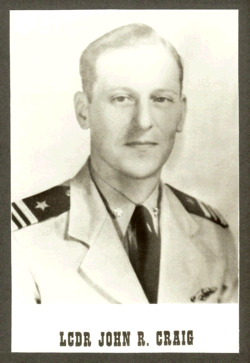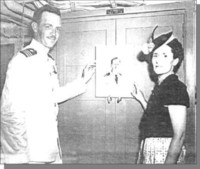|
 Lieutenant Commander John Rich Craig was born in
Jacksonville, Florida on September 3, 1906. He attended grade schools in
Jacksonville and the Duval High School, then entered the U. S. Naval Academy
from Florida in 1926. After graduation and commissioning in 1930, he was
assigned to USS SARATOGA Lieutenant Commander John Rich Craig was born in
Jacksonville, Florida on September 3, 1906. He attended grade schools in
Jacksonville and the Duval High School, then entered the U. S. Naval Academy
from Florida in 1926. After graduation and commissioning in 1930, he was
assigned to USS SARATOGA and served in her until March 1931, when he was ordered
to Naval Air Station Pensacola, Florida. He was detached from duty there in
September 1931 and during the next four and one half years served successively
on the carrier LEXINGTON, and destroyers NOA, SIMPSON, and LONG and the fleet
oilier NECHES. In January 1936 he reported to the Submarine Base, New London,
Connecticut for instruction in submarines. After completing the course’s in May
1936, he joined USS S-34 in Honolulu. In September 1937, he was transferred to
USS S-24, serving in her until May 1938, when he returned to the United States . and served in her until March 1931, when he was ordered
to Naval Air Station Pensacola, Florida. He was detached from duty there in
September 1931 and during the next four and one half years served successively
on the carrier LEXINGTON, and destroyers NOA, SIMPSON, and LONG and the fleet
oilier NECHES. In January 1936 he reported to the Submarine Base, New London,
Connecticut for instruction in submarines. After completing the course’s in May
1936, he joined USS S-34 in Honolulu. In September 1937, he was transferred to
USS S-24, serving in her until May 1938, when he returned to the United States .
Lieutenant Commander Craig had duty in the Bureau of Navigation, Navy
Department, Washington, D. C. from June 1938 until December 1940, when he
assumed command of USS R-17. In June 1942, he was ordered to duty on the staff
of Commander, Submarines, Southwest Pacific, and on September 15, 1942, he
assumed command of USS GRAMPUS. He was declared missing in action on March 22,
1943 when USS GRAMPUS was lost in the Southwest Pacific area. LCDR Craig was
declared dead on March 23, 1944.
Lieutenant Commander Craig was awarded the Purple Heart posthumously. He had
received the American Defense Service Medal, Fleet Clasp, and the
Asiatic-Pacific Area Campaign Medal. For service in USS GRAMPUS, he received the
Navy Cross with the following Citation:
“For extraordinary heroism as Commanding Officer of the USS GRAMPUS engaged in
war patrols. Despite the great mental and physical strain of prolonged patrols
in enemy-controlled waters, Lieutenant Commander Craig launched repeated, daring
attacks on Japanese shipping, sinking two enemy transports and one cargo ship,
totaling 24,000 tons, and damaging three enemy destroyers. His efficient and
inspiring leadership and the loyal devotion to duty of the men under his command
throughout the period made possible the successful accomplishment of a vital and
hazardous mission.” |

